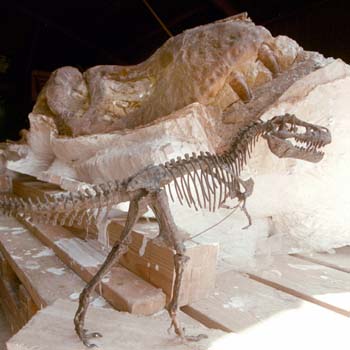Fossilized dinosaur faeces that are almost certainly attributed to the Tyrannosaurus Rex dinosaur - may, according to the scientists, shed light on the eating habits of the king of the dinosaurs

The scientific term is "coprolite", but to the layman what is found in Canada is simply fossilized feces. But it's not just prehistoric excrement: the find - which is almost certainly attributed to a Tyrannosaurus Rex dinosaur - may, according to the scientists, shed light on the eating habits of the king of the dinosaurs. The fossil, which weighs 7.1 kg and is about half a meter long, is twice as large as previous findings of carnivore feces. The scientists - led by Karen Chin, from the US Geological Survey in Menlo Park, and Timothy Takarik, from the Royal Museum in Saskatchewan, Canada - reported the discovery in the journal "NATURE". Their victims to pieces, with bites, before they swallowed them.
The find proves that the dinosaur was very different from most modern reptiles, which swallow large parts of their prey whole. A closer examination of the find revealed thick pieces of bone with a wavy shape, like that of the three-horned dinosaur - Triceratops - the favorite prey of the T-Rex.
The scientists were surprised to find findings that indicate that the T-Rex had difficulty digesting the bones it swallowed. "This rare example of fossilized food remains helps us improve our understanding of the behavior of carnivorous dinosaurs by providing physical evidence that T-Rex crushed, swallowed, but did not perfectly digest, huge amounts of bone when it ate a young dinosaur," the researchers wrote.
21.6.1998 - Published in Haaretz. - The knowledge website was until 2002 part of the IOL portal from the Haaretz group
